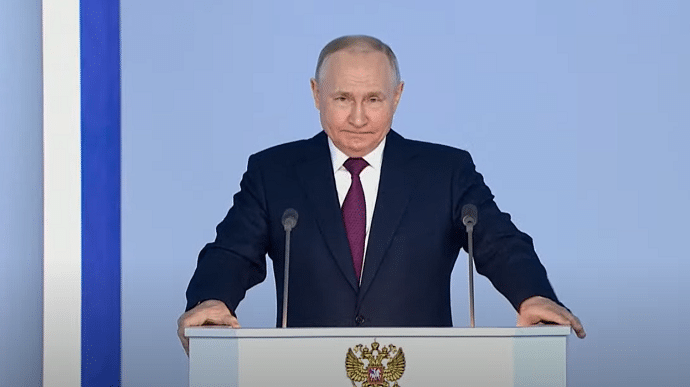News
As Putin Begins Another 6-Year Term, He Is Entering A New Era Of Extraordinary Power In Russia

Just a few months shy of a quarter-century as Russia’s leader, Vladimir Putin, will sign a copy of the constitution on Tuesday, ushering in another six-year term as president with unparalleled powers.
Since becoming acting president on December 31, 1999, Putin has shaped Russia into a monolith, crushing political opposition, expelling independent journalists, and promoting an increasing adherence to prudish “traditional values” that push many in society to the margins.
His authority is so strong that other leaders could only stand on the sidelines while Putin began a war in Ukraine, despite predictions that the invasion would bring worldwide condemnation and harsh economic penalties, as well as cost Russia dearly in the blood of its men.
AP – VOR News Image
As Putin Begins Another 6-Year Term, He Is Entering A New Era Of Extraordinary Power In Russia
The war in Ukraine, in which Russia is making gradual but continuous battlefield advances, is the primary issue, and he shows no signs of reversing direction.
“The war in Ukraine is crucial to his current political ambition, and I see no reason to believe that will change. “And that affects everything else,” Brian Taylor, a Syracuse University professor and author of “The Code of Putinism,” told The Associated Press.
“It affects who’s in what positions, it affects what resources are available and it affects the economy, affects the level of repression internally,” he said.
In his February State of the Union address, Putin vowed to carry out Moscow’s objectives in Ukraine and do everything necessary to “defend our sovereignty and the security of our citizens.” He stated that the Russian military has “gained a huge combat experience” and is “firmly holding the initiative and waging offensives in several sectors.”
That will come at a high cost, potentially depleting funds for the massive domestic projects and changes in education, welfare, and poverty alleviation that Putin detailed in his two-hour presentation.
Taylor believed such initiatives were included in the address primarily for show rather than to indicate a genuine commitment to implement them.
Putin “thinks of himself in the broad historical terms of Russian territory, putting Ukraine back to where it belongs, and things like that. And I believe them outweigh any more socioeconomic-type programs,” Taylor added.
Suppose the battle does not result in absolute loss for either side, with Russia maintaining some of the territory it has already conquered. In that case, European governments fear Putin will be tempted to engage in additional military adventurism in the Baltics or Poland.
AP – VOR News Image
As Putin Begins Another 6-Year Term, He Is Entering A New Era Of Extraordinary Power In Russia
“It’s possible that Putin does have vast ambitions and will try to follow up on a costly success in Ukraine with a new attack somewhere else,” Harvard international relations expert Stephen Walt wrote in Foreign Policy. “But it is also entirely possible that his ambitions do not extend beyond what Russia has won — at enormous cost and that he has no need or desire to gamble for more.”
However, he said, “Russia will be in no shape to launch new wars of aggression when the war in Ukraine is finally over.”
Others argue that such a sensible worry may not prevail. According to Maksim Samorukov of the Carnegie Russia Eurasia Center, “Moscow is likely to make self-defeating mistakes driven by Putin’s whims and delusions.”
In a Foreign Affairs column, Samorukov stated that Putin’s age may influence his judgment.
“At 71, his awareness of his death undoubtedly influences his decision-making. A rising awareness of his short time influenced his catastrophic choice to attack Ukraine.
Overall, Putin may be entering his new term with less influence than he appears to have.
Russia’s “vulnerabilities are concealed in plain sight. “Now more than ever, the Kremlin makes decisions in a personalized and arbitrary manner, with no basic controls,” Samorukov stated.
“The Russian political elite have grown more pliant in implementing Putin’s orders and more obsequious about his paranoid worldview,” he stated in the letter. The country’s leadership “is at permanent risk of crumbling overnight, as its Soviet predecessor did three decades ago.”
Putin is certain to maintain his hostility against the West, which, he stated in his State of the Nation speech, “would like to do to Russia the same thing they did in many other regions of the world, including Ukraine: to bring discord into our home, to weaken it from within.”
Russia banned the fictitious LGBTQ+ “movement” last year, labeling it extreme in what officials claimed was a fight for traditional values such as those promoted by the Russian Orthodox Church against Western influence. Courts also prohibited gender transformation.
“I would expect the role of the Russian Orthodox Church to continue to be quite visible,” Taylor said. He also mentioned the social media anger that erupted during a party held by TV presenter Anastasia Ivleeva, in which guests were urged to arrive “almost naked.”
AP – VOR News Image
As Putin Begins Another 6-Year Term, He Is Entering A New Era Of Extraordinary Power In Russia
“Other actors in the system understand that that stuff resonates with Putin. … There were people interested in exploiting things like that,” he went on to say.
Although the opposition and independent media have nearly evaporated as a result of Putin’s repressive actions, there is still room for future movements to dominate Russia’s information space, such as continuing efforts to construct a “sovereign internet.”
The inauguration takes place two days before Victory Day, Russia’s most important secular festival honoring the Soviet Red Army’s seizure of Berlin in World War II and the war’s terrible difficulties, which cost the USSR around 20 million people.
The defeat of Nazi Germany is important to modern Russia’s character, as is Putin’s justification of the war in Ukraine as an analogous conflict.
SOURCE – (AP)